Resume
Senior Resident Cover Letter Examples

May 29, 2025
|
12 min read
Crafting your senior resident cover letter with a medical twist: Navigate your way to the heart of the hiring team with these essential tips. Improve your chances by adding a personal touch to show you’re the perfect “resident” fit!
4.70 Average rating
Rated by 348 people
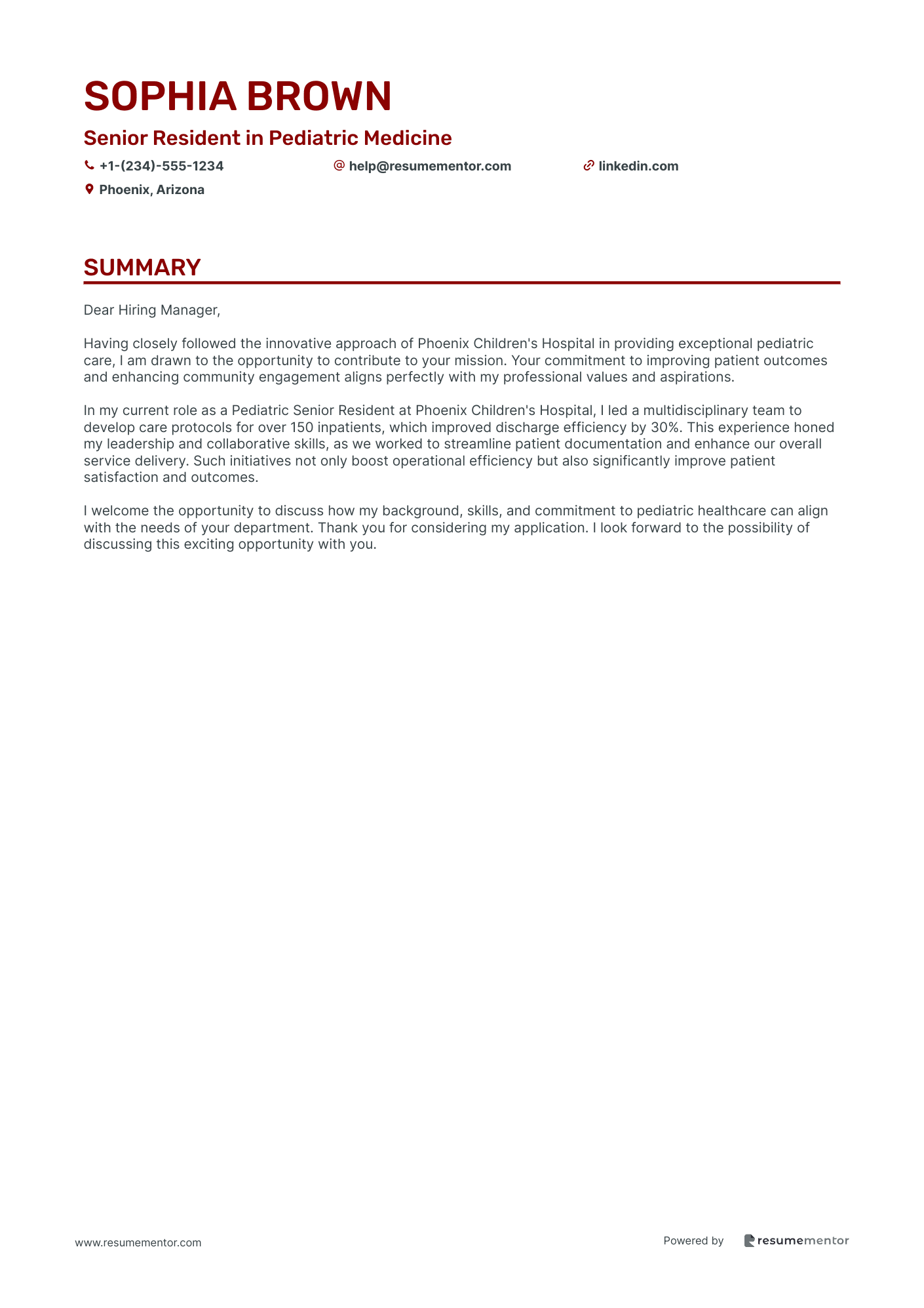
Senior Resident in Pediatric Medicine
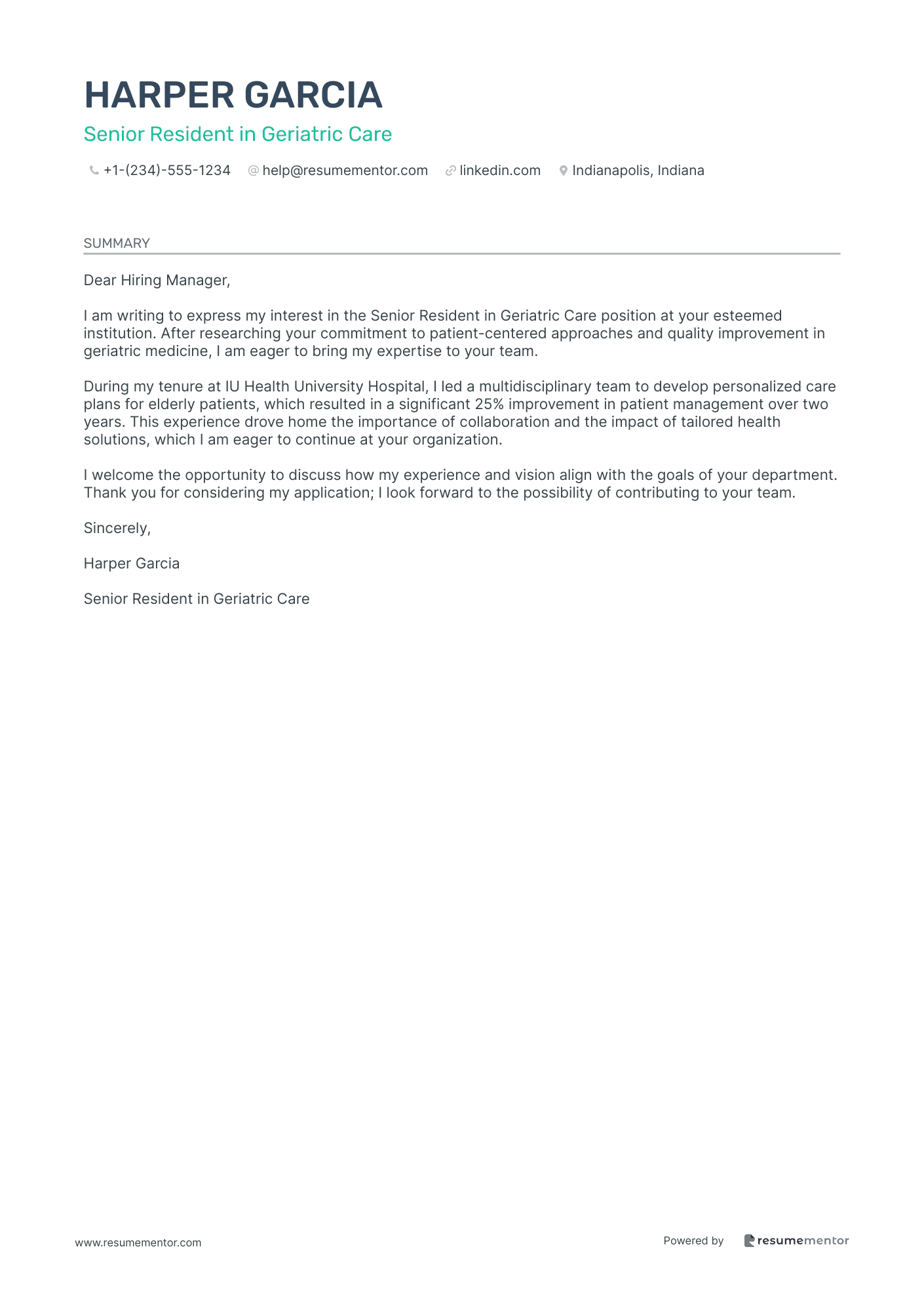
Senior Resident in Geriatric Care
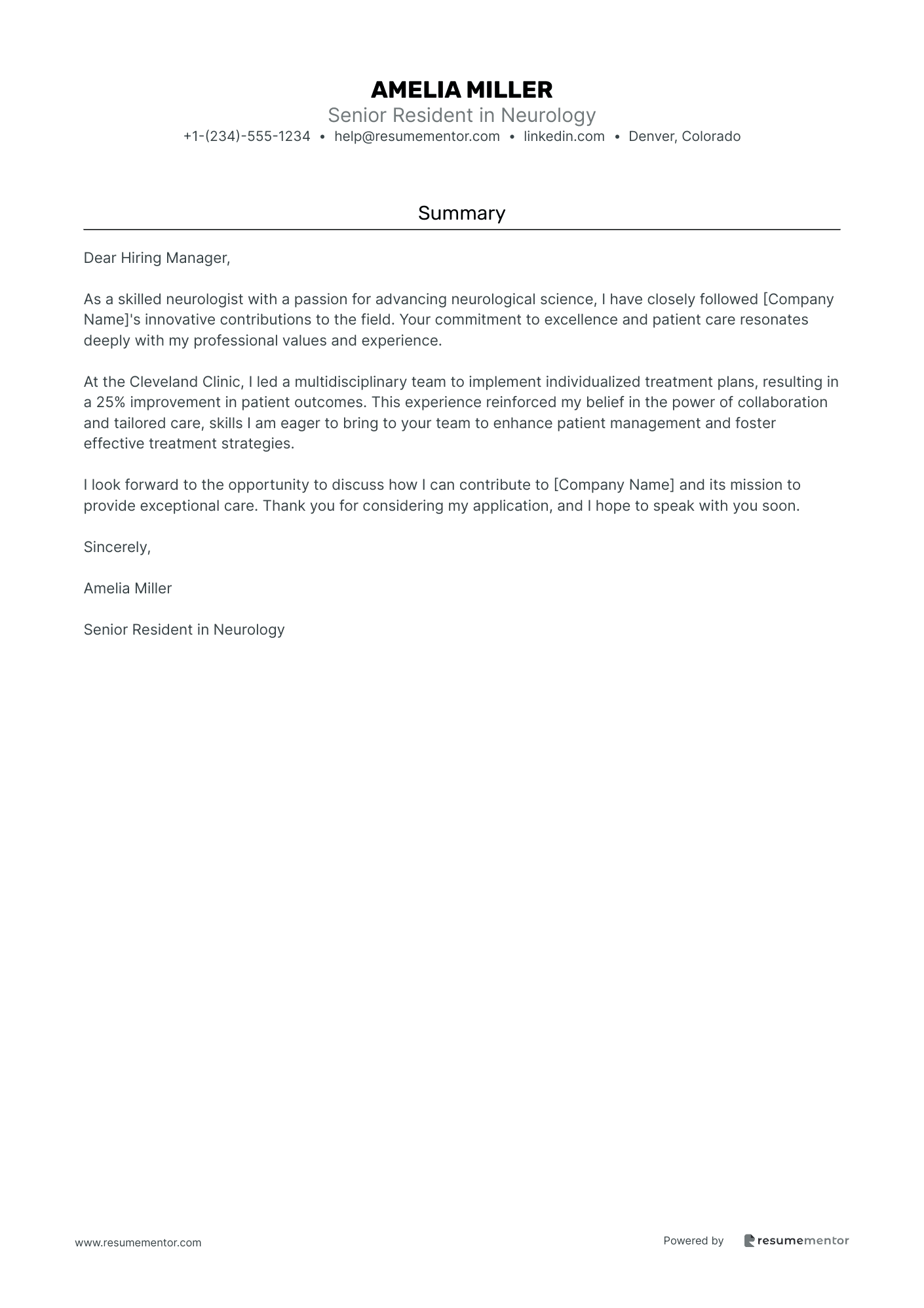
Senior Resident in Neurology
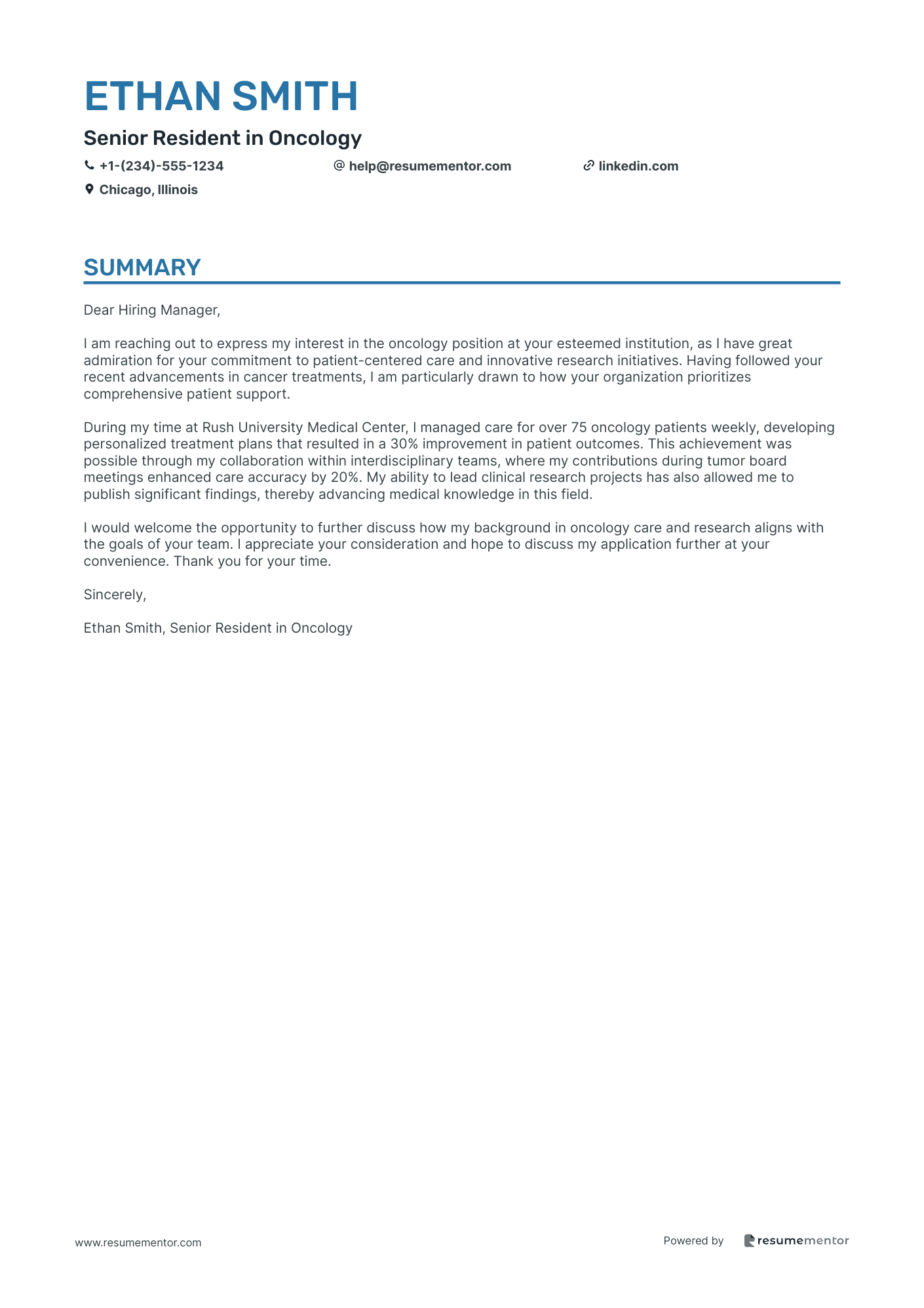
Senior Resident in Oncology
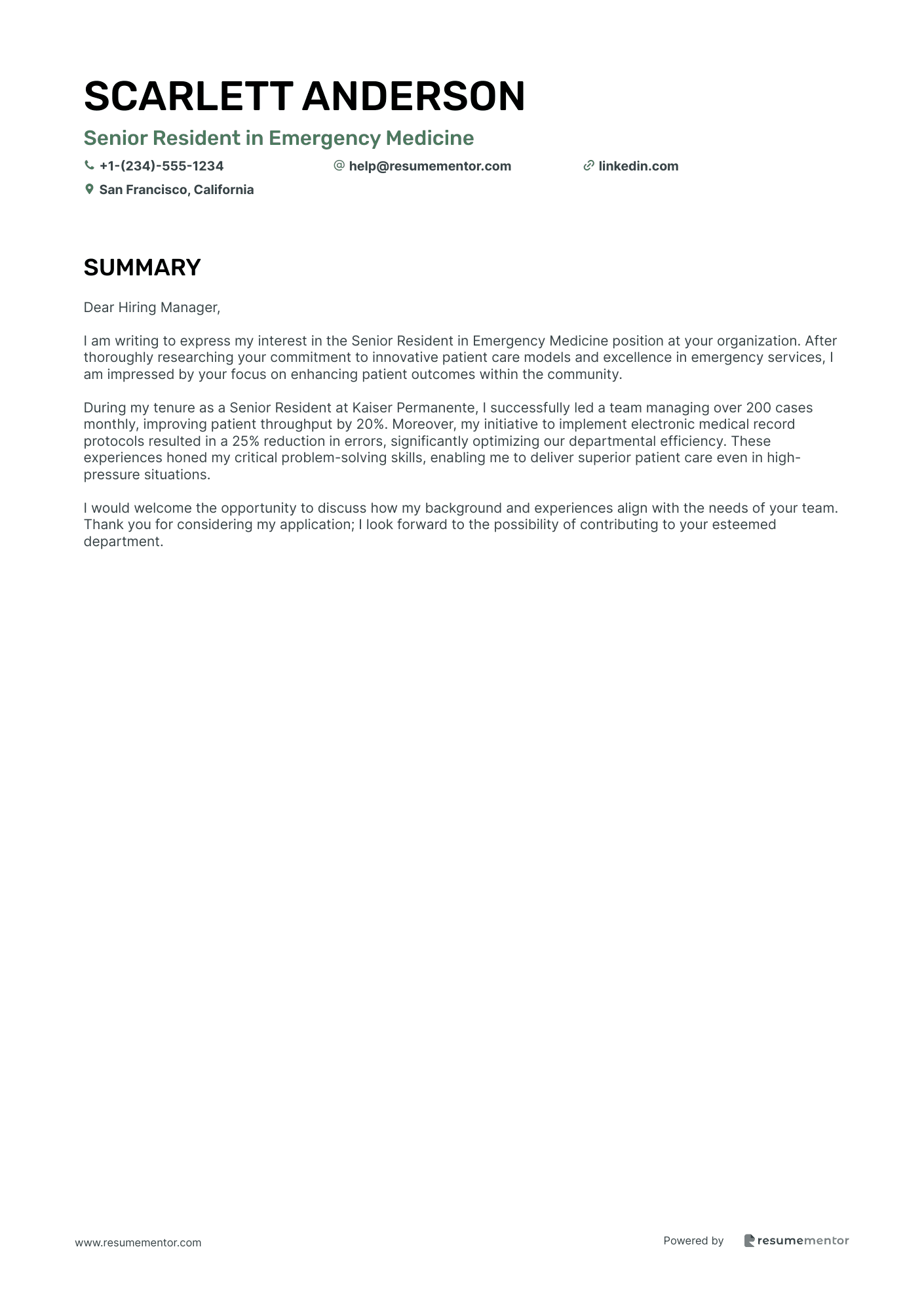
Senior Resident in Emergency Medicine
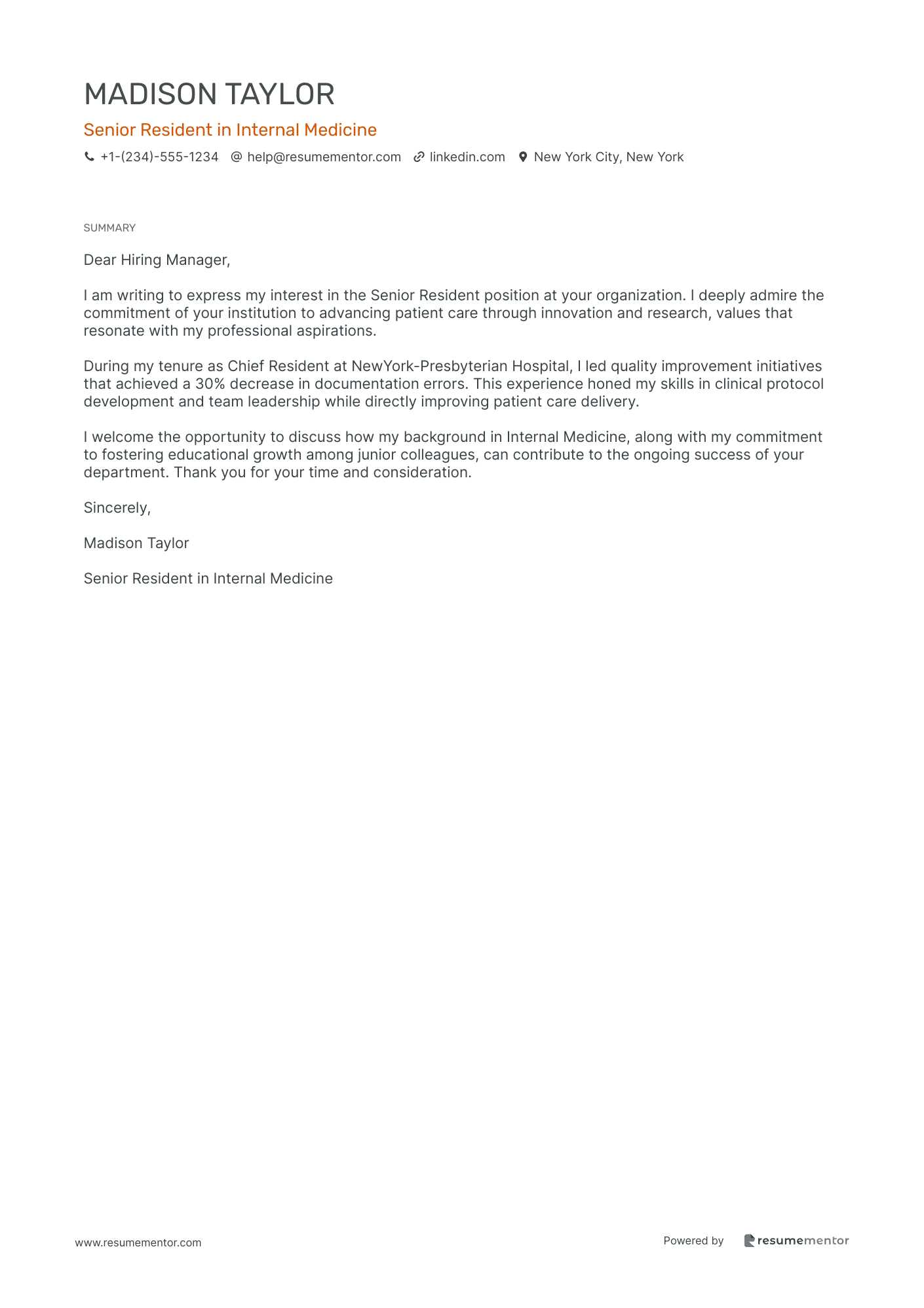
Senior Resident in Internal Medicine
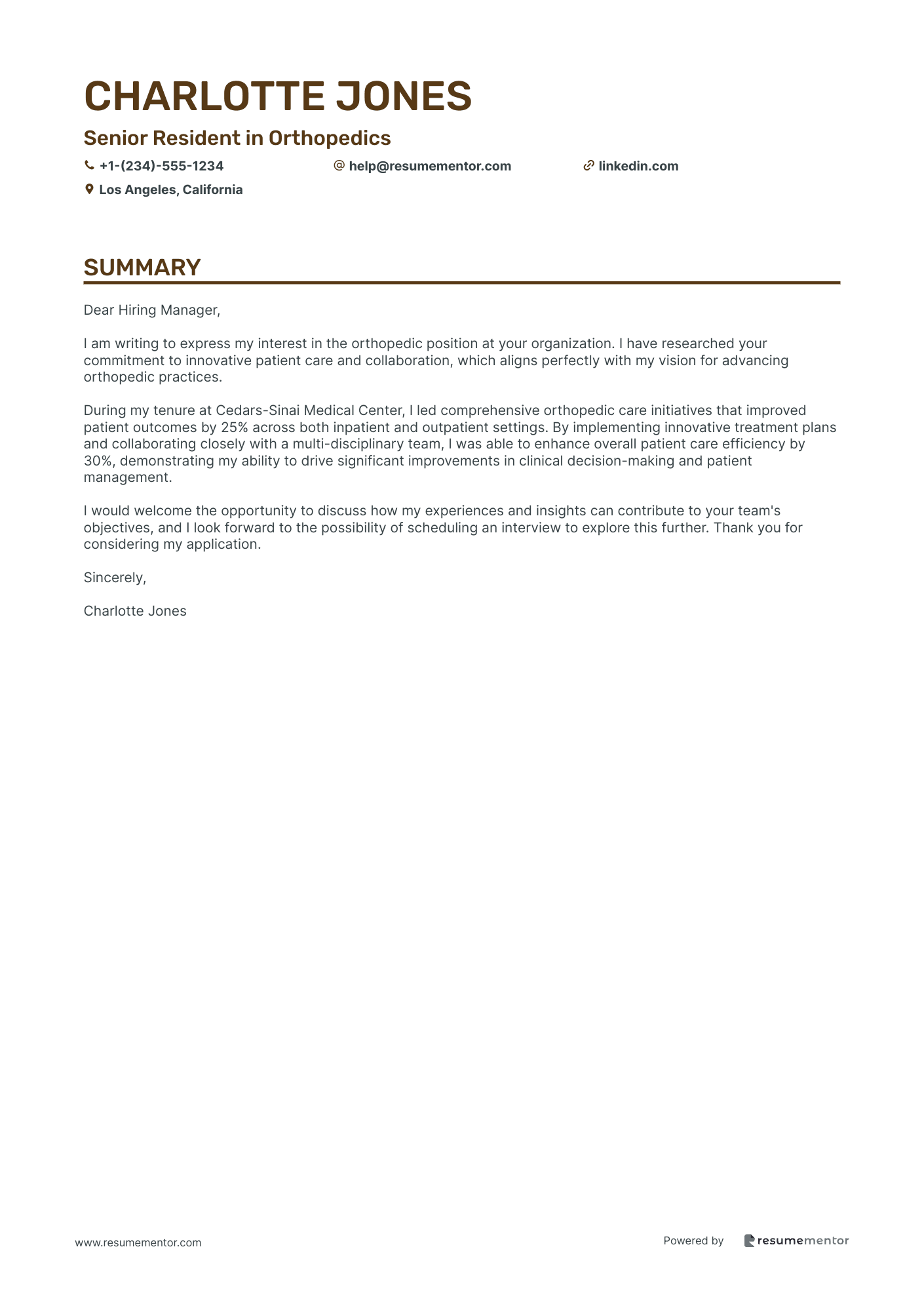
Senior Resident in Orthopedics
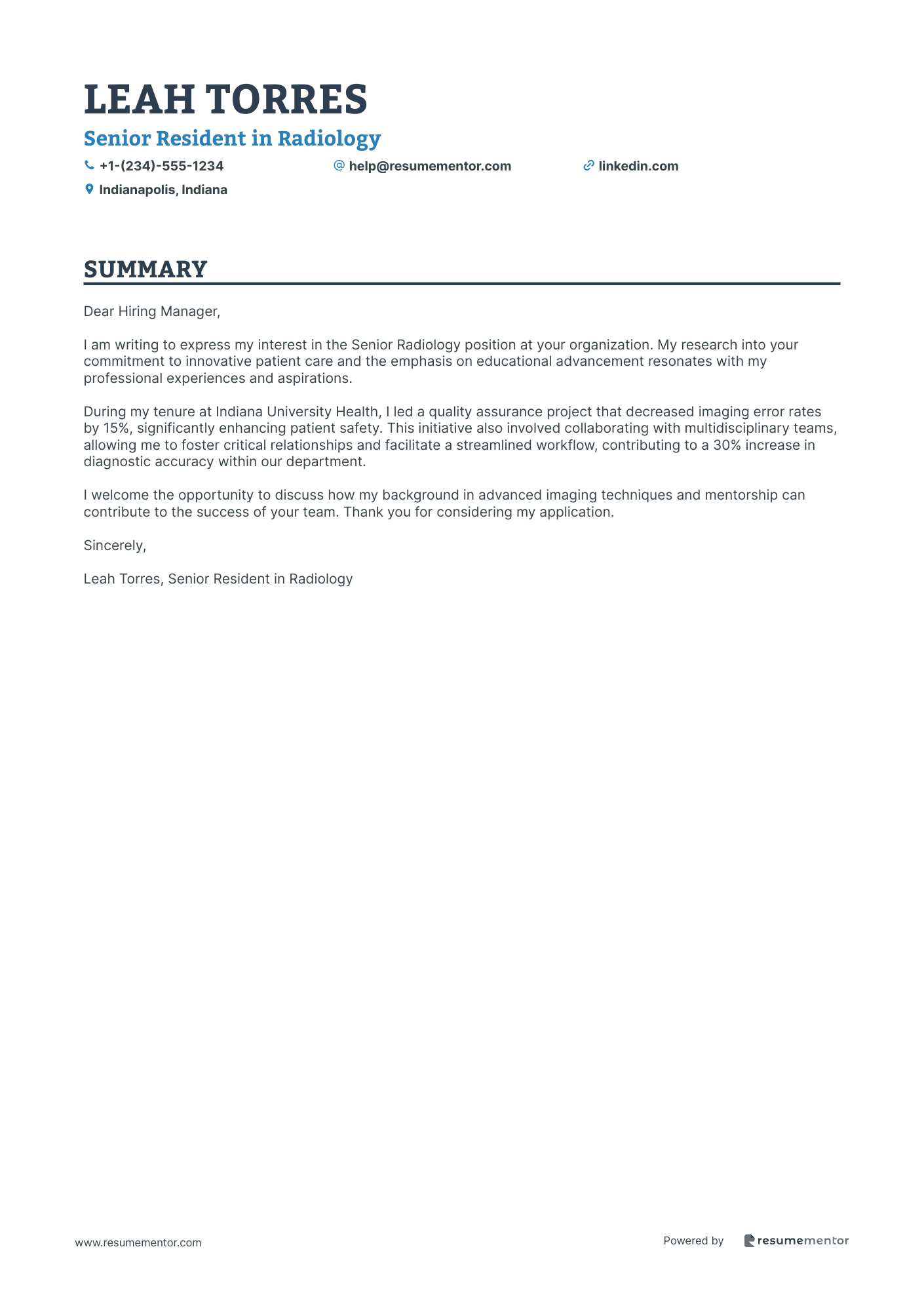
Senior Resident in Radiology
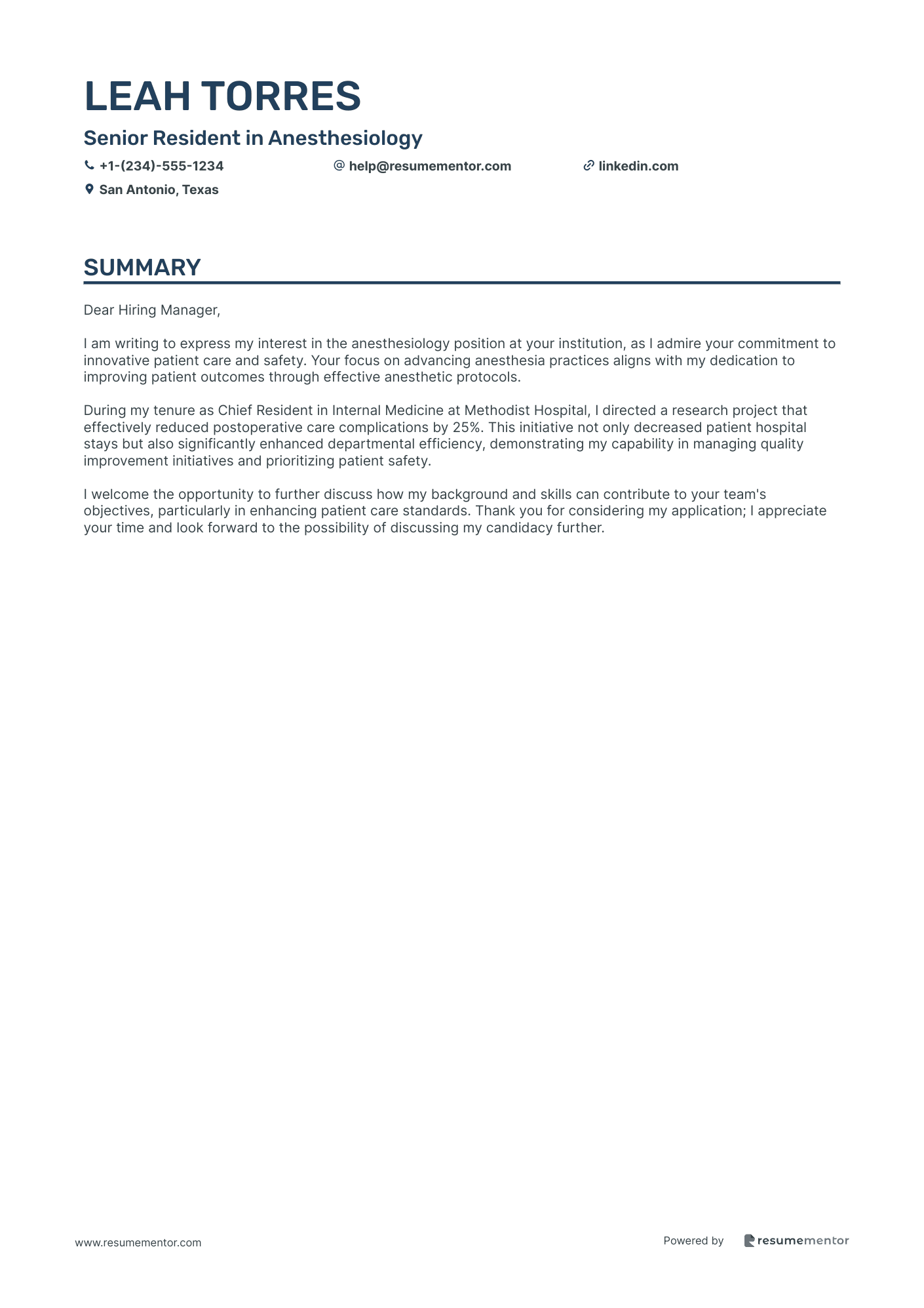
Senior Resident in Anesthesiology
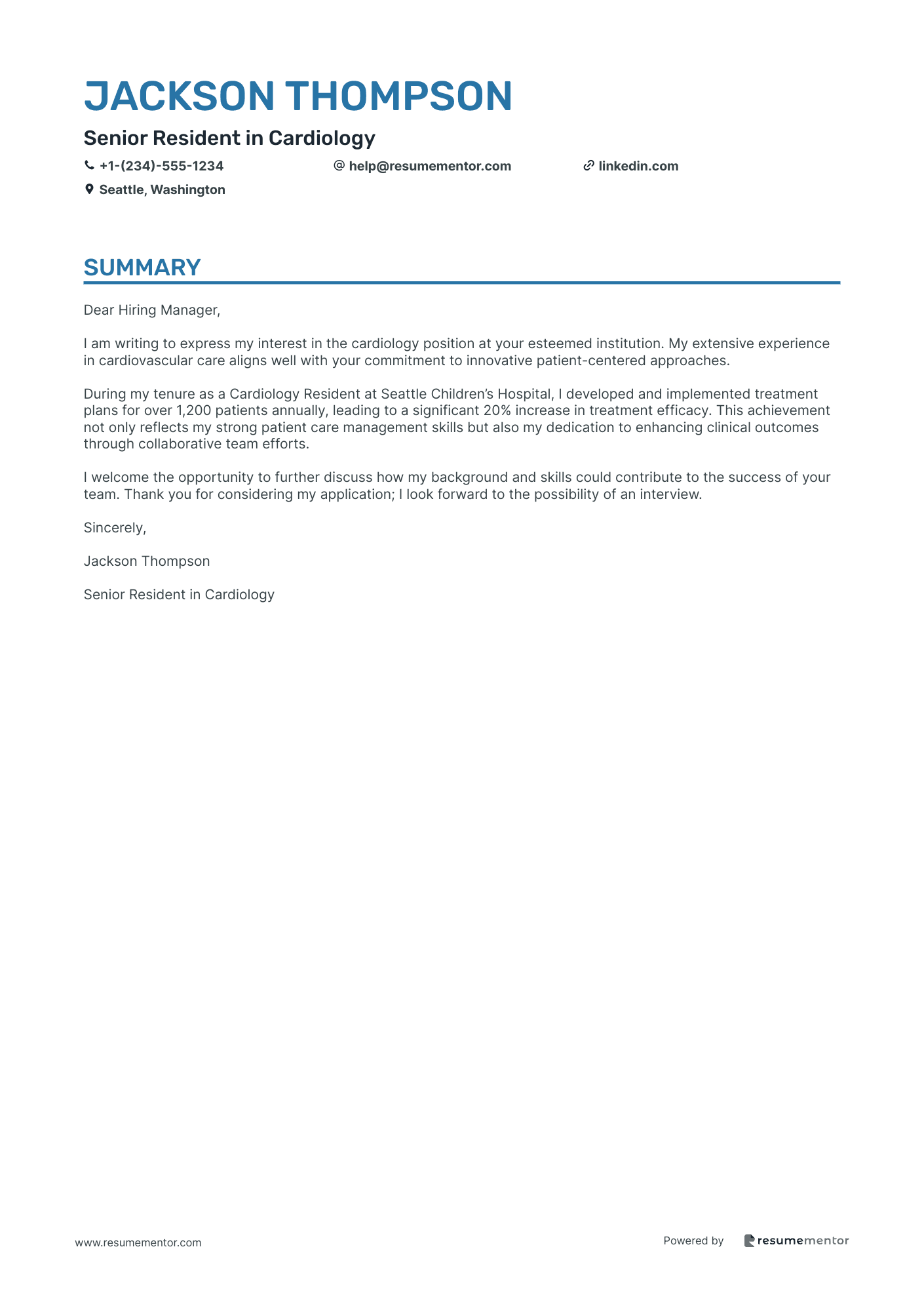
Senior Resident in Cardiology

Senior Resident in Pediatric Medicine cover letter sample
When applying for this position, be sure to highlight your clinical rotations specifically related to pediatric care. Emphasize any hands-on experience with diagnosing and treating children, as well as any leadership roles in team settings. Certifications in pediatric advanced life support or similar courses can enhance your credentials. Include examples where your interventions improved patient outcomes or family satisfaction scores, using a 'skill-action-result' format. Showcasing your ability to communicate effectively with children and their families will further strengthen your application.
Sophia Brown
Senior Resident in Pediatric Medicine
Summary
Dear Hiring Manager,
Having closely followed the innovative approach of Phoenix Children's Hospital in providing exceptional pediatric care, I am drawn to the opportunity to contribute to your mission. Your commitment to improving patient outcomes and enhancing community engagement aligns perfectly with my professional values and aspirations.
In my current role as a Pediatric Senior Resident at Phoenix Children's Hospital, I led a multidisciplinary team to develop care protocols for over 150 inpatients, which improved discharge efficiency by 30%. This experience honed my leadership and collaborative skills, as we worked to streamline patient documentation and enhance our overall service delivery. Such initiatives not only boost operational efficiency but also significantly improve patient satisfaction and outcomes.
I welcome the opportunity to discuss how my background, skills, and commitment to pediatric healthcare can align with the needs of your department. Thank you for considering my application. I look forward to the possibility of discussing this exciting opportunity with you.
Senior Resident in Geriatric Care cover letter sample
When applying for this position, it's essential to highlight any previous experience in geriatric care or related fields. Showcase your ability to work with older adults, emphasizing empathy and patience. Mention specialized training, such as certifications in geriatrics or palliative care, to underline your knowledge. Include examples of how you've improved patient outcomes or enhanced quality of life through personalized care plans. Use a 'skill-action-result' format to clearly demonstrate how your actions have positively affected the well-being of your patients and the overall care environment.
Harper Garcia
Senior Resident in Geriatric Care
Summary
Dear Hiring Manager,
I am writing to express my interest in the Senior Resident in Geriatric Care position at your esteemed institution. After researching your commitment to patient-centered approaches and quality improvement in geriatric medicine, I am eager to bring my expertise to your team.
During my tenure at IU Health University Hospital, I led a multidisciplinary team to develop personalized care plans for elderly patients, which resulted in a significant 25% improvement in patient management over two years. This experience drove home the importance of collaboration and the impact of tailored health solutions, which I am eager to continue at your organization.
I welcome the opportunity to discuss how my experience and vision align with the goals of your department. Thank you for considering my application; I look forward to the possibility of contributing to your team.
Sincerely,
Harper Garcia
Senior Resident in Geriatric Care
Senior Resident in Neurology cover letter sample
When applying for this role, it's important to showcase your clinical experience in neurology. Highlight any rotations or fellowships that involved neurological assessments or treatments. Emphasize your proficiency in diagnostic techniques, like EEGs or MRIs, and any specialized training you've undergone. Mention your participation in research studies or publications related to neurology; this demonstrates your commitment to advancing the field. Lastly, provide specific instances where your expertise led to improved patient outcomes, using the 'skill-action-result' model to clearly illustrate your impact.
Amelia Miller
Senior Resident in Neurology
Summary
Dear Hiring Manager,
As a skilled neurologist with a passion for advancing neurological science, I have closely followed [Company Name]'s innovative contributions to the field. Your commitment to excellence and patient care resonates deeply with my professional values and experience.
At the Cleveland Clinic, I led a multidisciplinary team to implement individualized treatment plans, resulting in a 25% improvement in patient outcomes. This experience reinforced my belief in the power of collaboration and tailored care, skills I am eager to bring to your team to enhance patient management and foster effective treatment strategies.
I look forward to the opportunity to discuss how I can contribute to [Company Name] and its mission to provide exceptional care. Thank you for considering my application, and I hope to speak with you soon.
Sincerely,
Amelia Miller
Senior Resident in Neurology
Senior Resident in Oncology cover letter sample
Focus on highlighting your extensive clinical experience and case management skills. Mention any specialized training or fellowships you’ve completed in oncology, as well as any certifications in treatments or therapies. Provide examples of your involvement in multidisciplinary teams and how you’ve contributed to patient care, using a 'skill-action-result' framework. Describe your abilities in managing complex cases and improving patient outcomes. If you've participated in research, discuss how these efforts led to advancements in treatment protocols or patient education initiatives.
Ethan Smith
Senior Resident in Oncology
Summary
Dear Hiring Manager,
I am reaching out to express my interest in the oncology position at your esteemed institution, as I have great admiration for your commitment to patient-centered care and innovative research initiatives. Having followed your recent advancements in cancer treatments, I am particularly drawn to how your organization prioritizes comprehensive patient support.
During my time at Rush University Medical Center, I managed care for over 75 oncology patients weekly, developing personalized treatment plans that resulted in a 30% improvement in patient outcomes. This achievement was possible through my collaboration within interdisciplinary teams, where my contributions during tumor board meetings enhanced care accuracy by 20%. My ability to lead clinical research projects has also allowed me to publish significant findings, thereby advancing medical knowledge in this field.
I would welcome the opportunity to further discuss how my background in oncology care and research aligns with the goals of your team. I appreciate your consideration and hope to discuss my application further at your convenience. Thank you for your time.
Sincerely,
Ethan Smith, Senior Resident in Oncology
Senior Resident in Emergency Medicine cover letter sample
When applying for this position, emphasize your clinical experience in high-pressure environments. Highlight any leadership roles you’ve taken during rotations, showcasing your ability to guide a team. Include certifications such as ACLS or ATLS to demonstrate your readiness. Provide examples of case outcomes where your intervention improved patient care. Use a 'skill-action-result' format to illustrate how your decision-making skills led to successful patient management. Be sure to mention any research contributions or quality improvement projects you’ve been involved in, as they underline your commitment to the field.
Scarlett Anderson
Senior Resident in Emergency Medicine
Summary
Dear Hiring Manager,
I am writing to express my interest in the Senior Resident in Emergency Medicine position at your organization. After thoroughly researching your commitment to innovative patient care models and excellence in emergency services, I am impressed by your focus on enhancing patient outcomes within the community.
During my tenure as a Senior Resident at Kaiser Permanente, I successfully led a team managing over 200 cases monthly, improving patient throughput by 20%. Moreover, my initiative to implement electronic medical record protocols resulted in a 25% reduction in errors, significantly optimizing our departmental efficiency. These experiences honed my critical problem-solving skills, enabling me to deliver superior patient care even in high-pressure situations.
I would welcome the opportunity to discuss how my background and experiences align with the needs of your team. Thank you for considering my application; I look forward to the possibility of contributing to your esteemed department.
Senior Resident in Internal Medicine cover letter sample
When preparing your cover letter, highlight your clinical rotations and any specialized training in internal medicine. It's important to showcase your diagnostic and critical thinking skills, as well as your ability to work in a team. Mention experiences where you've successfully managed complex cases, emphasizing patient outcomes. If you've participated in research or quality improvement initiatives, include these details to demonstrate your commitment to advancing medical knowledge. Use specific examples to illustrate how your contributions have positively impacted patient care and your previous teams.
Madison Taylor
Senior Resident in Internal Medicine
Summary
Dear Hiring Manager,
I am writing to express my interest in the Senior Resident position at your organization. I deeply admire the commitment of your institution to advancing patient care through innovation and research, values that resonate with my professional aspirations.
During my tenure as Chief Resident at NewYork-Presbyterian Hospital, I led quality improvement initiatives that achieved a 30% decrease in documentation errors. This experience honed my skills in clinical protocol development and team leadership while directly improving patient care delivery.
I welcome the opportunity to discuss how my background in Internal Medicine, along with my commitment to fostering educational growth among junior colleagues, can contribute to the ongoing success of your department. Thank you for your time and consideration.
Sincerely,
Madison Taylor
Senior Resident in Internal Medicine
Senior Resident in Orthopedics cover letter sample
Highlight any specialized training in orthopedic surgery or relevant fellowships you have completed. Emphasize your hands-on experience in surgical procedures, including the number of surgeries performed and types of cases managed. Discuss your knowledge of innovative techniques or technologies used in the field. Provide examples of how your skills have resulted in improved patient outcomes or reduced recovery times. Mention any leadership roles in team settings and your ability to collaborate with other healthcare professionals, showcasing your impact on overall departmental performance.
Charlotte Jones
Senior Resident in Orthopedics
Summary
Dear Hiring Manager,
I am writing to express my interest in the orthopedic position at your organization. I have researched your commitment to innovative patient care and collaboration, which aligns perfectly with my vision for advancing orthopedic practices.
During my tenure at Cedars-Sinai Medical Center, I led comprehensive orthopedic care initiatives that improved patient outcomes by 25% across both inpatient and outpatient settings. By implementing innovative treatment plans and collaborating closely with a multi-disciplinary team, I was able to enhance overall patient care efficiency by 30%, demonstrating my ability to drive significant improvements in clinical decision-making and patient management.
I would welcome the opportunity to discuss how my experiences and insights can contribute to your team's objectives, and I look forward to the possibility of scheduling an interview to explore this further. Thank you for considering my application.
Sincerely,
Charlotte Jones
Senior Resident in Radiology cover letter sample
When applying for this position, highlight your clinical experience in imaging techniques such as MRI, CT, and ultrasound. Include any fellowships or specialized training you have completed. Showcase your ability to accurately interpret results and collaborate with medical teams to develop treatment plans. Mention any contributions to research studies or publications that demonstrate your commitment to advancing the field. It's essential to provide examples of how your diagnostic skills have positively impacted patient outcomes, detailing the skill-action-result framework to illustrate your effectiveness.
Leah Torres
Senior Resident in Radiology
Summary
Dear Hiring Manager,
I am writing to express my interest in the Senior Radiology position at your organization. My research into your commitment to innovative patient care and the emphasis on educational advancement resonates with my professional experiences and aspirations.
During my tenure at Indiana University Health, I led a quality assurance project that decreased imaging error rates by 15%, significantly enhancing patient safety. This initiative also involved collaborating with multidisciplinary teams, allowing me to foster critical relationships and facilitate a streamlined workflow, contributing to a 30% increase in diagnostic accuracy within our department.
I welcome the opportunity to discuss how my background in advanced imaging techniques and mentorship can contribute to the success of your team. Thank you for considering my application.
Sincerely,
Leah Torres, Senior Resident in Radiology
Senior Resident in Anesthesiology cover letter sample
When crafting your cover letter, it is essential to highlight your clinical experience in anesthesia. Detail any specific techniques you've mastered, such as regional anesthesia or sedation protocols. Emphasize your ability to work collaboratively in a multidisciplinary team. If you’ve led quality improvement initiatives or participated in research, mention these achievements. Discuss how your patient management skills have led to positive outcomes, using specific examples to illustrate your impact. Close with a statement about your commitment to continuous learning and patient safety.
Leah Torres
Senior Resident in Anesthesiology
Summary
Dear Hiring Manager,
I am writing to express my interest in the anesthesiology position at your institution, as I admire your commitment to innovative patient care and safety. Your focus on advancing anesthesia practices aligns with my dedication to improving patient outcomes through effective anesthetic protocols.
During my tenure as Chief Resident in Internal Medicine at Methodist Hospital, I directed a research project that effectively reduced postoperative care complications by 25%. This initiative not only decreased patient hospital stays but also significantly enhanced departmental efficiency, demonstrating my capability in managing quality improvement initiatives and prioritizing patient safety.
I welcome the opportunity to further discuss how my background and skills can contribute to your team's objectives, particularly in enhancing patient care standards. Thank you for considering my application; I appreciate your time and look forward to the possibility of discussing my candidacy further.
Senior Resident in Cardiology cover letter sample
When applying for this position, it's essential to detail your clinical experience in cardiology cases. Highlight any advanced training or fellowships you've completed, as well as certifications such as Advanced Cardiac Life Support (ACLS). Discuss your proficiency with diagnostic procedures like echocardiograms and stress tests. Include instances where you made critical decisions that improved patient outcomes. Use specific metrics to illustrate your contributions. Emphasize teamwork and collaboration, particularly in multidisciplinary settings, showcasing how your efforts supported other medical professionals and enhanced patient care.
Jackson Thompson
Senior Resident in Cardiology
Summary
Dear Hiring Manager,
I am writing to express my interest in the cardiology position at your esteemed institution. My extensive experience in cardiovascular care aligns well with your commitment to innovative patient-centered approaches.
During my tenure as a Cardiology Resident at Seattle Children’s Hospital, I developed and implemented treatment plans for over 1,200 patients annually, leading to a significant 20% increase in treatment efficacy. This achievement not only reflects my strong patient care management skills but also my dedication to enhancing clinical outcomes through collaborative team efforts.
I welcome the opportunity to further discuss how my background and skills could contribute to the success of your team. Thank you for considering my application; I look forward to the possibility of an interview.
Sincerely,
Jackson Thompson
Senior Resident in Cardiology
Related Articles

Continue Reading
Check more recommended readings to get the job of your dreams.
Resume
Resources
Tools
© 2026. All rights reserved.
Made with love by people who care.
